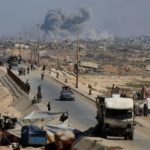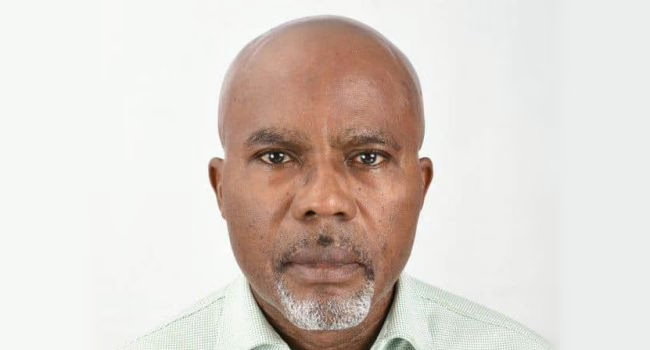RIDICULE! This term aptly describes the slogan chosen for the independence-day-parade-canceled/” title=”Surprise Announcement: Tomorrow Declared Public Holiday as … Day Parade Gets Canceled!”>65th anniversary of our nation’s independence. The federal government introduced what feels more like a sarcastic tagline when announcing the events leading up to tomorrow’s national celebrations. Nigeria attained political independence on October 1, 1960, amid great fanfare and high hopes from Africa and the global Black community. The official theme for this milestone, “Nigeria @65: All Hands on Deck for a Greater Nation,” ostensibly highlights the importance of unity, cooperation, and patriotism among government bodies, private enterprises, civil society, and citizens to foster a nation characterized by peace, prosperity, and progress.
According to the government, this theme calls for a united effort to build on past successes and chase loftier national goals under the so-called ‘Renewed Hope Agenda.’ However, this is where the novelty ends. The rest of the anniversary program is predictable and uninspired. Scheduled activities include a Juma’at prayer on Friday, September 26, at 1:00 p.m.; an Inter-Denominational Church Service on Sunday, September 28, at 10 a.m.; and a World Press Conference on Monday, September 29, at 10 a.m. Meanwhile, the country will persist in its usual cycle of violence, extreme poverty, governmental neglect, insecurity, banditry, rising numbers of out-of-school children, and a swelling population of internally displaced persons (IDPs) despite not being officially at war. This grim reality fuels despair, hopelessness, and the ‘japa’ phenomenon-where young people and adults alike flee the country en masse-alongside rampant corruption and stalled development.
Historically, many Nigerian leaders, both military and civilian, have been short-sighted, nepotistic, and narrow-minded. Yet, the past decade under the All Progressives Congress (APC) has been particularly emblematic of policies that exacerbate the nation’s deep-seated fractures. The late Maj. Gen. Muhammadu Buhari (2015-2023) posed a significant threat to Nigeria’s unity despite his contrary claims. Notably, during a foreign visit, he openly stated that his presidency would prioritize only those who voted for him in 2015, effectively dividing the nation into supporters and detractors. This divisive stance became an unofficial state policy, poisoning the national atmosphere. Fortunately, Buhari’s tenure was marked more by absence and ineffective governance than active leadership, resulting in eight wasted years that set the country back by at least a generation. In a rare media appearance in December 2015, Buhari dismissively questioned, “What do the Igbos want?” in response to youth unrest in the southeast demanding a referendum on their continued membership in Nigeria. He also boasted of his role in the civil war (1967-1970), during which soldiers under his command killed unarmed civilians, including women and children. Throughout his presidency, Buhari disparaged the Igbo people, referring to them as a mere “dot in a circle,” a derogatory label he never applied to any other ethnic group. His administration may have been characterized by ‘ungovernance,’ but it undeniably left a legacy of division and animosity.
Those who hoped Buhari’s presidency would be the last to sow discord were mistaken, as his successor, Alhaji Bola Ahmed Tinubu, also from the APC, has continued in a similar vein. Even before assuming office, Tinubu declared the presidency as his and the Yoruba’s exclusive domain. His slogan, ’emi lo kan,’ reeks of selfishness, favoritism, corruption, and division. His appointments to key government positions have been so skewed that they make Buhari’s nepotism appear mild by comparison. While Tinubu’s selections have not overtly promoted sectarianism, they suggest the formation of a loyalist cult, rewarding allegiance rather than merit-a dangerous precedent for a fragile nation. He unabashedly brands public infrastructure with his name, despite not having built any during his two years in office. His appointments of Yoruba individuals are largely confined to Lagos State, where he served as governor from 1999 to 2007, favoring his close associates while sidelining others, even within his ethnic group. Discontent has been widespread, including among his own Yoruba community.
READ ALSO: Niger, Mali, Burkina Faso intelligence agencies threaten to expose Nigerian politicians sponsoring terrorists -Report
Buhari mocked Nigerians during his 2018/2019 reelection campaign with the plagiarized slogan ‘NextLevel.’ Now, Tinubu seems to be continuing this trend of cynicism with the 65th anniversary theme. How can one sincerely call for ‘All Hands on Deck for a Greater Nation’ while simultaneously excluding large segments of Nigerian society from meaningful participation? Numerous examples illustrate this contradiction. Take the national census, for instance. Nigeria has not conducted a credible headcount in nearly two decades, despite the international standard of a census every ten years. The failed Buhari administration promised a census but never delivered, likely aware that any attempt would have been disastrous. Now, Tinubu’s government is preparing for a census, but it is doubtful that a credible count will be completed before his term ends in 2027. Moreover, the current census planning committee is heavily skewed in its composition, casting doubt on the impartiality of the process.
Nigeria comprises 36 states and the Federal Capital Territory, commonly grouped into six geopolitical zones: South East, South West, South South in the south, and North East, North West, and North Central in the north. These zones, though informal, guide political appointments and resource distribution. Each zone has a regional development commission established by federal law. However, the High-Level Committee on National Population and Housing Census, recently formed to oversee the upcoming census, includes members from only three of the six zones. The committee has eight members: three from the north and five from the south. Yet, the northern representation excludes the North East zone, home to Vice President Alhaji Kashim Shettima. The southern representation is even more lopsided, with all five members hailing from the South West, President Tinubu’s region, while the South East and South South zones are entirely absent. Such blatant exclusion undermines the credibility of the census and invites disputes over its results, which are crucial for fair resource allocation. Unfortunately, sidelining key stakeholders has become a recurring theme in Nigeria’s governance.
As we mark 65 years of independence tomorrow, we should reflect with frustration and disappointment. We have let ourselves down, failed Africa, and betrayed the hopes of Black people worldwide. Countries that once trailed behind us have now surged ahead. Blessed with abundant natural resources, Nigeria had the potential to join the ranks of developed nations, yet we have repeatedly chosen leaders who have steered us toward ruin. While we avoided continuous military dictatorships from the 1960s to the 1990s, this is no excuse for the country’s decline. In other nations, citizens have ousted oppressive military rulers; here, we have rarely succeeded in removing ineffective elected leaders after their first term, allowing them to cling to power through electoral manipulation. Let us hope we do not continue to gaze into the future with misplaced optimism.
AUTHOR: UGO ONUOHA
The opinions expressed in this article are those of the author and do not necessarily reflect the views of this website or its editorial team.
















